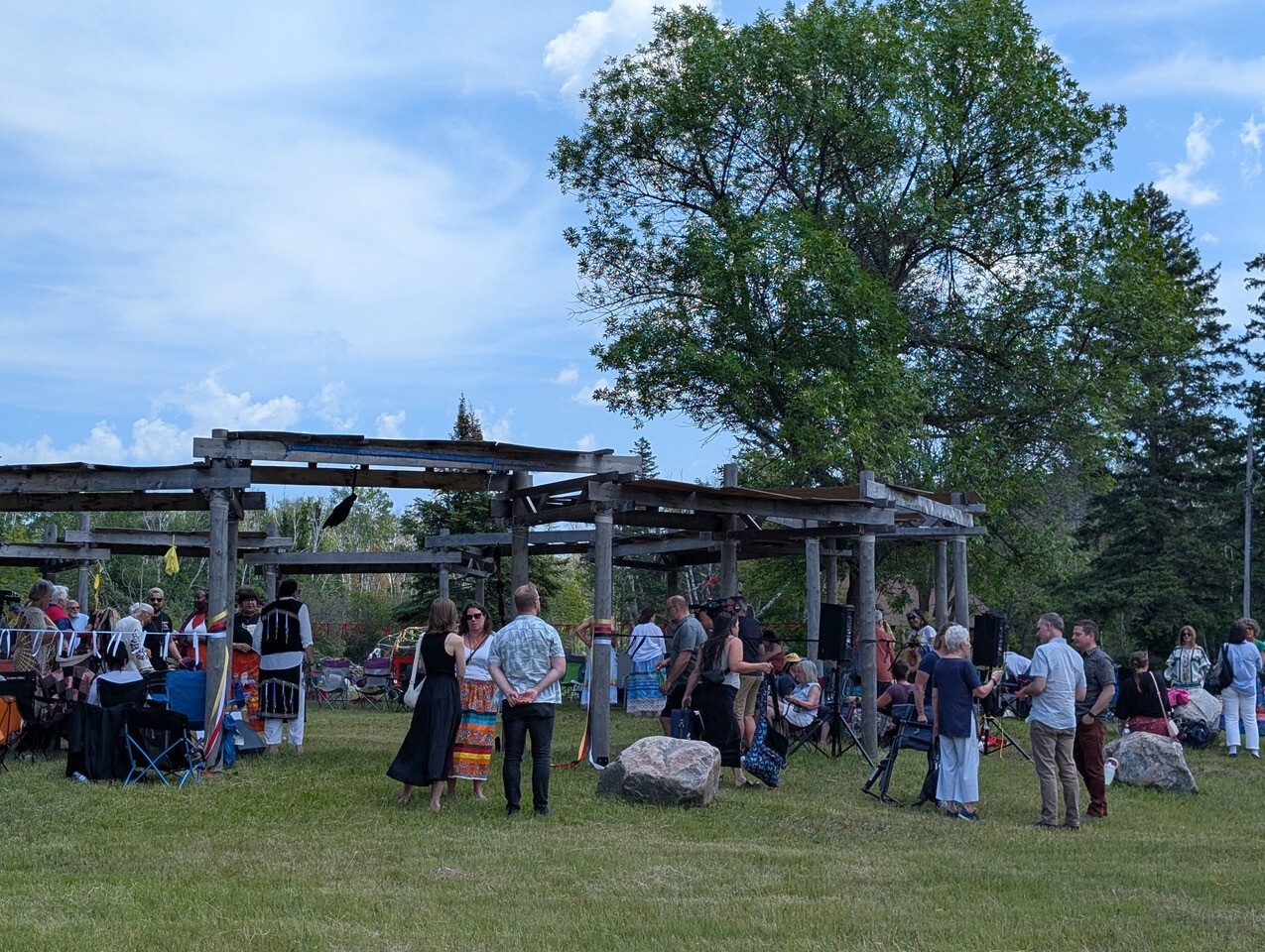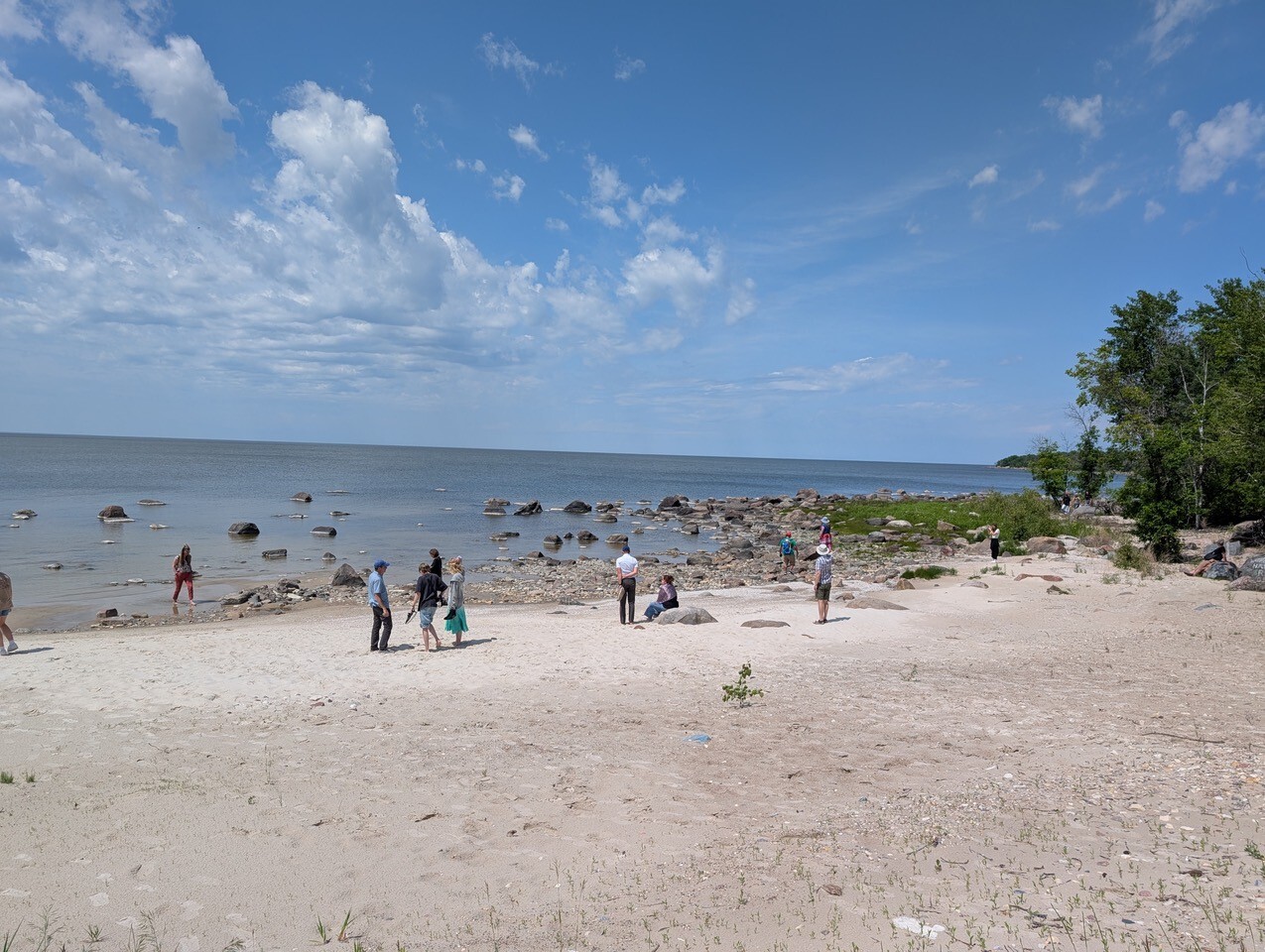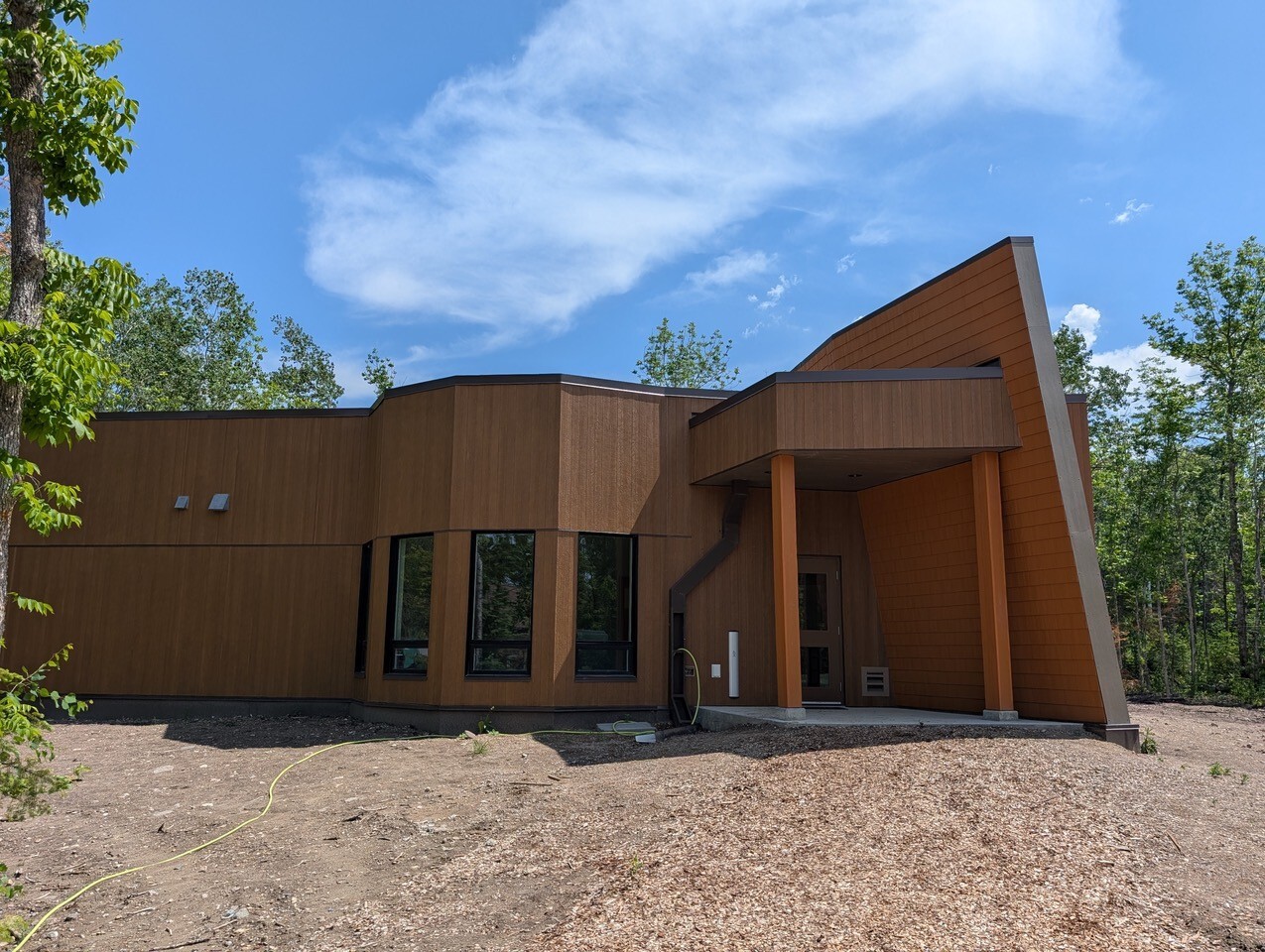September 16th, 2025Opening of Clan Mothers Healing Village and Knowledge Centre
Healing mothers heal families and communities” - Clan Mothers motto
We don’t have all the answers, but we can try, says Jamie Goulet about efforts to restore health to abused and trafficked Indigenous women.
Winnipeg - A dream to help heal Indigenous survivors of generational trauma, human trafficking, sexual violence, and exploitation is unfolding on the eastern shores of Lake Winnipeg.
 The Clan Mothers Healing Village and Knowledge Centre is led by Indigenous women, for Indigenous women. It held its grand opening near Belair, north of Winnipeg, on June 20. The hosts welcomed 250 funders, supporters, volunteers and community members.
The Clan Mothers Healing Village and Knowledge Centre is led by Indigenous women, for Indigenous women. It held its grand opening near Belair, north of Winnipeg, on June 20. The hosts welcomed 250 funders, supporters, volunteers and community members.
Clan Mothers shared with guests their ongoing plans for a holistic, community-centred Healing Village and social enterprise aimed at restoring purpose, health, and vibrant life to women and girls who have endured a lifetime of harm.
Jamie Goulet is the Vision Keeper, and the Co-founder, of Clan Mothers Healing Village and Knowledge Centre with her mother, Elder Mae Louise Campbell.
Campbell started what would become Clan Mothers in 1989 in response to sexual violence and domestic abuse in Indigenous communities. Together, the pair work to restore historic knowledge and experience of matriarch-led communities passed down through generations. They aim to rebuild meaningful Indigenous lifeways to traumatized women and girls.
Goulet said the loss of matriarchal leadership among Indigenous communities is a direct result of colonialism. When European settlers arrived, the patriarchal governance systems of Europeans projected male-dominated leadership on Indigenous communities. By the time the first treaty negotiations began, exclusive male-to-male relations were the expected norm, soon to be institutionalized by the Indian Act of 1875.
Clan Mothers aims to correct the generations-long imposition of male-dominated leadership by “resurrecting the understanding of mother-centred societies," said Goulet.
The work began in the backyard of a home in the storied Point Douglas neighbourhood of Winnipeg, where women — often living on the streets — came to receive women-centred teaching and healing. Later, they continued the work through the Grandmother Moon Lodge established at St. Laurent, on the eastern shores of Lake Manitoba, That setting offered a more healing-friendly, natural environment. After 18 years, a multitude of factors forced its closure, but the need for its work remained.
In 2007, a vision arose to continue and expand the healing work to a village model, and create a space for residential, long-term healing for “women, girls, two-spirit and transgender persons who have been victims of multi-generational trauma, sexual violence, sexual exploitation, and human trafficking,” said Goulet.
The first task was to find a land base to set up operations.
In 2010, Campbell, and Sister Norma McDonald, who was chaplain at what is now Université de Saint-Boniface, were part of a delegation at a conference in St. Louis. At the event, they had a chance meeting with Daniel Lussier, CEO of the Réseau Compassion Network. Lussier learned about Campbell’s work with vulnerable women and took note.
McDonald was aware that several congregations of Sisters in Manitoba were aging out of their ministries. She saw a good fit between the work of Clan Mothers and the caring ministry for marginalized women undertaken by several generations of the Sisters’ congregations.
 Fast forward to 2015: Lussier heard about a plot of land on the east side of Lake Winnipeg owned by Sisters of the Good Shepherd would soon become available. A plan was hatched to restore the land to Indigenous purposes. The land, valued at almost one million dollars, was officially gifted to Clan Mothers in 2021.
Fast forward to 2015: Lussier heard about a plot of land on the east side of Lake Winnipeg owned by Sisters of the Good Shepherd would soon become available. A plan was hatched to restore the land to Indigenous purposes. The land, valued at almost one million dollars, was officially gifted to Clan Mothers in 2021.
Goulet’s role as Vision Keeper comes from a long family tradition. “I guess I didn’t have a choice, because our whole family has always been geared to helping our people,” she said.
The Village and Knowledge Centre is a community living space that aims to help women heal from the physical, emotional, spiritual, and mental harms they have endured in unhealthy relationships, domestic abuse situations, and human trafficking. Its precise location is not being disclosed to protect the women who will go ther
“Women are at the centre of the [holistic] model,” said Goulet. “Then we add on social enterprise, which came from Indigenous philosophy, there was no hierarchy in the systems, everybody worked together, there were jobs, everybody helped in the community, everybody had a place.”
Many Indigenous people today have lost access to a healthy, holistic community, said Goulet. In today’s world, they are shuffled from one social service agency to the next in a futile effort to meet a dizzying array of specific criteria in order to get help. Women fall into dark corners of despair trying to stitch together a whole life for themselves and their families. Often, their children are wards of Child and Family Services — or they themselves have aged out of the socialized care system.
Some are trafficked into the sex trades, some fall into substance abuse. Some have been shunted to the margins of society for being gay, two-spirit, or transgender.
“In our community there is an incredible amount of incest, sexual abuse, and it hasn’t stopped, and I don’t know if we’ll be able to stop it,” said Goulet.
But hope abounds.
The Village will offer programs to help women heal from the physical, emotional, spiritual, and mental harms they have suffered. The motto is, “Healing mothers heal families and communities,” said Goulet.
Participants first pass through a 13-month process of healing from trauma, followed by job skills training that equips them for employment in a social enterprise.
Two initial cohorts of women have now developed into a crew that works with Park West Projects, an Indigenous owned construction company that has partnered with Clan Mothers. Additional partners collaborate on a 10-month training program led by a Red Seal carpenter. The trainees erect walls and roofs of dwellings that will house them and future participants, all while giving birth to a social enterprise called Mother Earth Construction.
Other endeavours and social enterprises are on the drawing board: a food sovereignty project with a greenhouse to grow produce and traditional medicines, a catering business, and an artistic program that will feature Indigenous fashion as storytelling and activism.
Goulet is not one to judge individuals for their plight and understands the uncertainty of the journey toward healing. How long a person stays at the Village depends on their need. “You can’t just take people off the street and stick them in an apartment [with no follow-up],” said Goulet.
Her dream is to replicate the Clan Mothers model in other places. She already has interest from two First Nation communities, but she is cautious, “We need to be five years fully operational until we can really share [more].”
Goulet is quick to recognize that the problem facing Indigenous women is huge, rooted in multi-generational trauma, and that it requires allies — including men — to participate in their own healing journey.
For Indigenous men, the effort to revive matriarchal leadership is a mixed bag, said Goulet. “Some, like any men, would be threatened by it, and others say, ‘Thank goodness they’re taking their rightful places because we’re tired of leading on our own. We need that way back in our communities.’”
Tim Rogalski, a math professor at Canadian Mennonite University, attends Clan Mothers ceremonies and events where men are explicitly welcomed. He understands that most of their sacred spaces are held for women and two-spirit people. “When men are included, I show up with care, respect, and support,” he wrote in an email response to the question of male involvement.
“Clan Mothers is a much-needed matriarchal resurgence. And for men, that’s not a cue to step back. It’s a call to step up: to support their leadership, to unlearn the patterns that lead to sexualized violence, and to walk with other men toward healing.”
Women helpers are welcomed. Michelle Montsion of Home Street Mennonite Church signed up to volunteer as a “rover” for a Clan Mothers Moondance Ceremony in 2024. A rover helps out wherever needed: registration, preparing food, washing dishes.
Initially Montsion felt like “a fish out of water,” she wrote in an email about her experience. But, “By the end of the 4-day ceremony I felt so gifted to have spent time with a beautiful community of committed, powerful Indigenous women focussed on love without judgement, restorative healing and healthy personal growth and wellness through Indigenous ceremony, teachings and supportive community.”
 She has since volunteered at multiple events, including the 2025 grand opening of the Clan Mother Healing Village and Knowledge Centre.
She has since volunteered at multiple events, including the 2025 grand opening of the Clan Mother Healing Village and Knowledge Centre.
Costs of the grand opening were offset by a $5,000 grant from the Mennonite Jubilee Fund. The Jubilee Fund is meant to address “in a small way the imbalance of wealth and power between people of Indigenous descent and Canada’s settler population,” according to its web page.
A May 2020 report in Canadian Mennonite magazine cites that the Canadian Conference of Mennonites created the fund in 1990 to focus on “areas where Mennonites have directly benefited from the treaty process,” noting that commitments to Indigenous communities had not been honoured. The resolution invited each family in the conference “to contribute toward this fund.”
On learning about the origins of the Jubilee Fund, McDonald, said, “I’m really happy that the Mennonite church prophetically started the Jubilee Fund [over] 30 years ago. Clan Mothers is really worthy of our support,” she said, noting relationships are better than handouts. Supporting Clan Mothers, she added, is a way of saying, “I believe this Healing Village is making a difference and allowing us to be part of your loving community.”
Jonathan Neufeld, Indigenous Relations Coordinator for Mennonite Church Canada, administers the Jubilee Fund with Ruth Plett of the Mennonite Central Committee Canada. Grant applications are reviewed and awards recommended by an ad-hoc group of Indigenous constituents within the Mennonite Church.
Neufeld is renewing the 1990 invitation to contribute to the Jubilee Fund. In an email, he wrote, “The role and voice of matriarchs was disrespected and diminished by governments, which are steeped in patriarchy, hand-in-hand with the Western Church. How far back would one have to go in Western European history to access that voice? Millennia.
“But I think that we have deep in our body memories, the sense that we have lost something crucial in our social ordering, a social-emotional wound that we don't easily name or address.”
The task that lies ahead for Clan Mothers is monumental, Goulet said. “Our Elders Council has asked us forever, ‘Are we ever going to stop sexual violence towards indigenous women and girls?’ And we don’t have the answers, but we can try.”
The “trying” is underway.
At its grand opening on June 20, Clan Mothers celebrated the completion of the Knowledge Centre, where matriarchal teaching will begin the healing journey for future participants. The residential Village component — a series of cabins that will eventually house up to 50 participants — is in development, though escalating costs of building materials is slowing progress.
The first participants are expected to arrive at the end of 2025.
-30-
Photo captions (in order of appearance):
About 250 guests including funders, supporters, and volunteers mingled at the grand opening of the Clan Mothers Healing Village and Knowledge Centre. - photo by Jonathan Neufeld
The Clan Mothers Healing Village and Knowledge Centre is situated on about 130 acres of land with water front on the east side of Lake Winnipeg. - photo by Jonathan Neufeld
The newly constructed Knowledge Centre building was the focus of a grand opening for the Clan Mothers Village and Knowledge Centre. - photo by Jonathan Neufeld